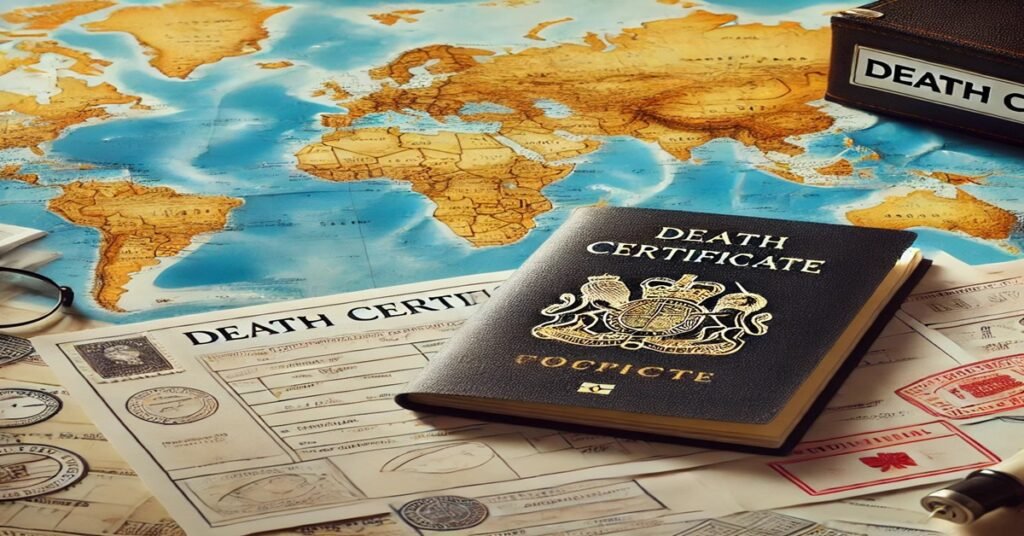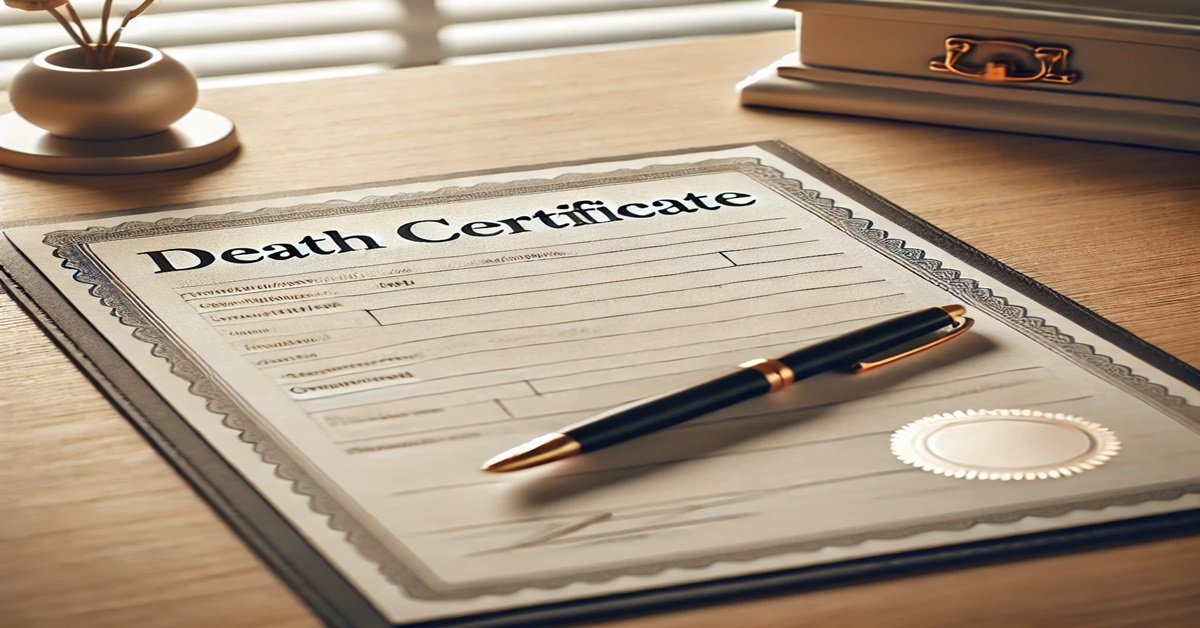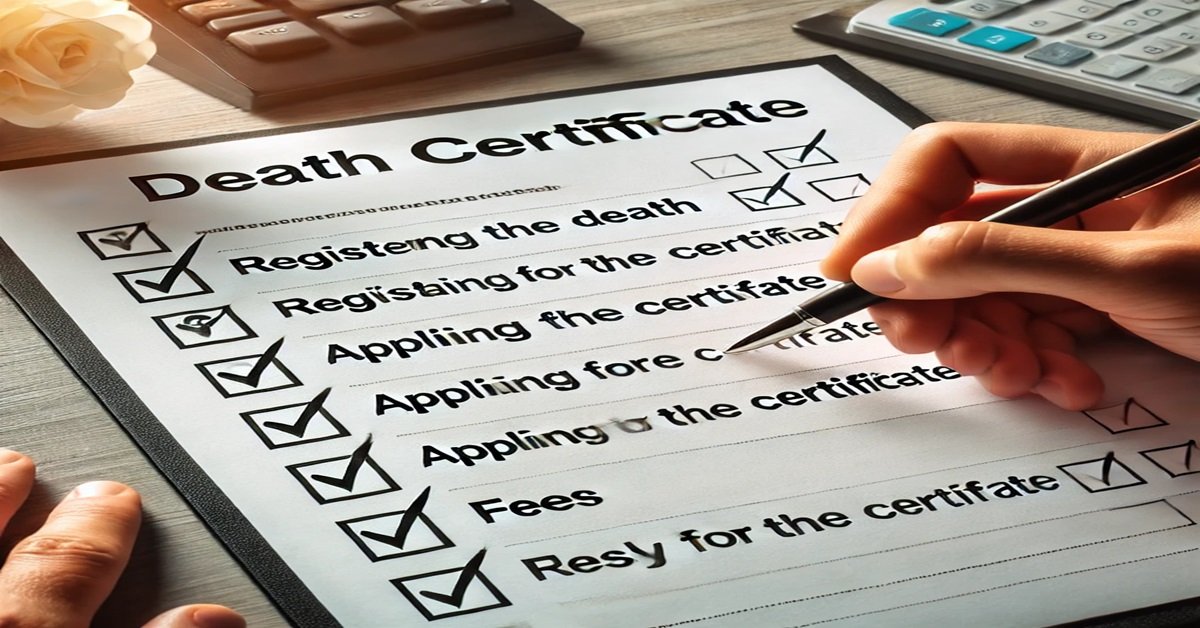- 01869 226760
- gail@bicesterwills.co.uk
- Mon - Fri: 8AM - 4PM
Table of Contents

How to Get a Death Certificate
When someone dies, getting a death certificate is an important step. This document proves that the person has passed away, and it’s needed for many things. For example, you’ll need it to deal with their estate, close bank accounts, and handle other legal matters like life insurance.
In the UK, the death must be registered within five days (or eight days in Scotland). After you register the death, you will get an official death certificate. Without it, sorting out the legal and financial issues can be harder. The certificate helps you manage important tasks during this difficult time.
By knowing how the process works, you can make sure everything goes smoothly and follows UK law.
What is a Death Certificate and Why Do You Need It?

A death certificate is an official paper that proves someone has died. It shows details like their name, age, and what caused their death. This certificate is very important for things like arranging the funeral, managing the person’s money, and handling legal matters like probate.
You need a death certificate to close the person’s bank accounts, claim insurance, or transfer property. Without it, some tasks can take longer or be harder to complete.
A question many people ask is, “How many death certificates do I need?” Since many places like banks and insurance companies need an original copy, it’s a good idea to order more than one. This way, you have enough for everything. Ordering extra copies when you register the death can save you time later.
If you need help with will writing or managing a loved one’s estate, contact Bicesterwills today. We are able to assist you with the procedure.
The Process of Registering a Death
Who Can Register a Death?
In the UK, only certain people can register a death. Usually, a close family member does this, like a spouse, parent, or child. If no family member can do it, someone who was there when the person died, or the executor of the will, can register the death. Remember, the death must be registered within five days (or eight days in Scotland).
Once you’ve registered the death, you can ask for a death certificate, which is needed for handling the person’s estate and other matters.
Where and When to Register the Death
You can register a death at your local registry office. Sometimes, if the person died in a hospital, you can register it there. Offices are usually open Monday to Friday, during regular working hours. For exact hours, it’s better to give them a call in advance or visit their website.
If you need help outside regular working days, like during a weekend or holiday, your local authority might have options to help you.
What You’ll Need to Register the Death
When you register a death, you need to bring some important papers. The most important one is the medical certificate from the doctor that shows the cause of death. You’ll also need some ID for the person who died, like a passport or birth certificate. If you don’t have all the documents, talk to the registrar, and they will help you with what to do.
How to Get a Death Certificate: Step-by-Step Guide

Step 1: Register the Death
The first step to getting a death certificate is to register the death. You can do this at your local registry office, usually within five days (or eight days in Scotland). You’ll need to provide details like the person’s full name, date of birth, and occupation. After you finish registering, you can ask for the death certificate. You won’t be able to get one until the death is registered.
Step 2: Request a Death Certificate
After you’ve registered the death, you can request the death certificate. Several approaches exist for achieving this:
- Online: You can order a death certificate on the government’s website. This is usually the fastest way, and you’ll get it within a few working days.
- By phone call: You can call your local registry office and ask for a death certificate. After you pay, they’ll mail it to you within a few days.
- By post: You can also send a letter to the registry office asking for a death certificate. Include the right information and payment, but this might take longer.
- In person: You can go to the registry office and ask for a certificate. Sometimes, you can get it the same day.
Step 3: Fees for Obtaining a Death Certificate
Getting a death certificate costs money. If you order it when you register the death, it usually costs about £11 in England and Wales. If you order more later, the price might be higher. It’s often a good idea to order several copies at once, especially if you need to give them to banks or other places. If you order extra copies later, you might also have to pay for postage.
Step 4: How Long Does It Take to Get a Death Certificate?
How long it takes to get a death certificate depends on how you order it. If you do it online or by phone call, it usually arrives in 5 to 7 working days. Ordering by post can take longer. If you go to the registry office in person, you might be able to get it the same day or within 24 hours.
Getting the paperwork sorted during this time can feel overwhelming, but knowing the steps helps make it easier.
If you need help with probate, Bicesterwills can guide you through the process. Contact us for expert advice.
Frequently Asked Questions
How Many Death Certificates Do I Need?
How many death certificates you need depends on how many tasks you have to do after someone passes away. For example, banks and insurance companies will each need an original certificate. That’s why it’s good to order more than one. Many people find that between 5 and 10 copies are enough, but you can always order more later if needed. It’s easier and cheaper to get them when you register the death.
How Long After a Death Should It Be Registered?
A death must be reported in the UK within five days, or eight days in the case of Scotland. This is the legal time limit, and it helps to get all the paperwork done, like arranging the funeral and getting the death certificate. If you miss the deadline, contact the registry office right away. They can offer advice and, in some cases, give you more time.
Can Anyone Register a Death?
Not just anyone can register a death. In the UK, only certain people can do it, usually a close family member like a spouse or child. If no family member is available, someone who was with the person when they died, or the executor of the will, can register the death. If there’s no one to do it, the local authority will step in and help.
Special Circumstances: Deaths Abroad and Coroner Involvement
Registering a Death Abroad
If someone dies outside the UK, the steps to register the death are different. First, you need to register the death with the local authorities in the country where the person passed away. You’ll need to get a death certificate from that country, usually through their embassy or consulate. After that, you can also register the death with UK authorities, but this isn’t required. Doing this might make managing things easier in the UK.
If the death certificate is in another language, you may need to get an official translation so UK institutions will accept it.
What Happens if a Coroner is Involved?
If a death is unexpected or unclear, a coroner may need to investigate to find out what happened. This could delay getting a death certificate, because the death can’t be registered until the coroner finishes their work. The coroner might need to do a post-mortem exam, or there could be an inquest to learn more about the cause of death.
Once the coroner completes their work, you can register the death and get the certificate. While this can take extra time, it ensures that the right cause of death is recorded.
If you need help with inheritance tax after a death, Bicesterwills can provide expert advice to help you and your family plan.
Obtaining Additional Copies of a Death Certificate
How Many Death Certificates Do I Need?
You might need extra death certificates if you’re dealing with multiple things, like closing accounts, claiming insurance, or handling pensions. Many places will need the original certificate, so it’s smart to order enough copies. Most people need between 5 and 10 certificates, but you can always order more later if needed.
How Much Does It Cost to Get Extra Copies?
The cost of extra death certificates depends on when you order them. If you get them when you register the death, they cost about £11 each in England and Wales. If you order more later, it may cost a bit more, and you might need to pay for postage. You can order extra copies online, by phone, or by visiting the registry office. Having enough copies can help make things easier.
What Happens After Registering a Death?
After registering a death and getting a death certificate, there are several important tasks to do. First, you need to tell financial institutions like banks, insurance companies, and pension providers to close or update accounts. You also need to tell government offices like HMRC to make sure taxes and benefits are updated.
If the person had a will, you might need to apply for probate to deal with their estate. If there is no will, the estate will be handled according to UK laws. You may also need to deal with inheritance tax, depending on how much the estate is worth.
Handling all of this can be hard, but planning ahead can make things easier. If you need help with planning for the future, contact Bicesterwills for assistance with care planning or setting up a Lasting Power of Attorney (LPA).
Final Thoughts
Getting a death certificate is an important step when someone dies. It allows you to handle legal and financial matters, like arranging the funeral and dealing with the estate. The main steps include registering the death, asking for the death certificate, and making sure you have enough copies for the organisations you need to contact. Sometimes, extra steps are needed if the death happened abroad or if a coroner is involved.
If you need help with wills, probate, inheritance tax, or care planning, Bicesterwills is here to guide you. Contact us today for expert advice.
Latest Post
-
How Much Does a Solicitor Charge for Power of Attorney?
October 18, 2024 LPA -
Valid Reasons for Child Name Change UK
September 9, 2024 Blog -
Automatic Divorce After 7 Years UK – Myth or Reality?
September 7, 2024 Blog -
What You Should Never Put in Your Will UK
August 19, 2024 Wills






